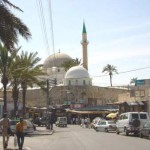Acre (or Akko), Israel, port 10 mi (16 km) from Haifa across the Bay of Acre.
Greek legend says that Hercules was once seriously wounded here. He found the herbs to cure his wounds, in this port city and named it Aka for cure. Greeks settled here in the third century BC. The name of this 4,000-year-old city appears is spelled many different ways. Officially, it is usually spelled as Acre (in English). However, in Hebrew, the city’s name is pronounced Akko.
Acre was incorporated into the empire of Alexander the Great after his conquest in 332 B.C. The Egyptian king Ptolemy II subsequently seized the city. He renamed the city Ptolemais in the 2nd century B.C. This name stuck until the Muslim conquest in the 7th century A.D.
The Arabs conquered the city in 638 A.D. and developed its natural harbor. In 1104 it was captured in the First Crusade and was held by Christians until 1187 when Saladin took it. It was retaken in the Third Crusade in 1191 and was the center of Christianity in the Holy Land for the next century.
The Ottoman Turks took Akko in 1517 and with the help of the British withstood a 61-day siege by Napoleon in 1799. British troops captured the city in 1918 and assigned it to the Arabs in the 1948 partition of Palestine.
Israeli forces in the Arab-Israeli war of 1948 captured Acre. By the 1990s its population was about three fourths Jewish and one fourth Arab. The city is a popular tourist site. Landmarks include an ancient citadel, walled fortifications, the al-Jazzar mosque, and several churches dating from the Crusades.
Akko is one of the most dramatic and captivating of Israel’s cities. Within its walls are labyrinthine networks of alleys and streets filled with life.
